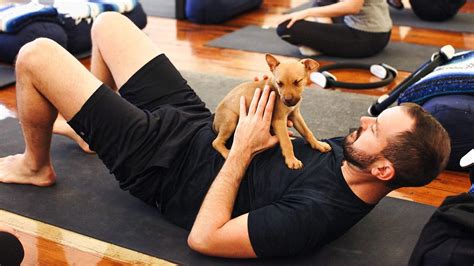Introduction
Puppy yoga, the fusion of yoga and puppy play, has gained immense popularity in recent years. To address the growing interest, this comprehensive article provides answers to frequently asked questions about this unique practice.

1. What is Puppy Yoga: Definition and Benefits
Puppy yoga is a hybrid activity that combines traditional yoga poses with the presence of adorable puppies. Studies have shown that interacting with puppies can reduce stress, lower blood pressure, and promote overall well-being.
2. Who is Puppy Yoga Suitable For?
Puppy yoga is generally suitable for individuals who:
- Enjoy yoga and want to try something different
- Are comfortable and respectful of puppies
- Have no allergies or concerns around dogs
3. VS: Puppy Yoga vs Traditional Yoga
Similarities:
- Both involve physical poses and breathing techniques
Differences:
- Presence of puppies in puppy yoga
- Higher level of happiness and relaxation in puppy yoga
- Social interaction with both puppies and participants
4. Where to Find Puppy Yoga Classes
Puppy yoga classes can be found at:
- Yoga studios
- Animal shelters
- Community centers
- Private events
5. How to Prepare for Puppy Yoga: Dos and Don’ts
Dos:
- Bring comfortable yoga attire
- Arrive early to settle in and meet the puppies
- Respect the puppies’ boundaries
Don’ts:
- Wear loose or dangling jewelry
- Bring valuables
- Feed the puppies without permission
6. How Much Does Puppy Yoga Cost?
The cost of puppy yoga classes varies depending on location, studio, and class duration. Expect to pay between $20-$40 per class.
7. What to Expect During a Puppy Yoga Class: Step-by-Step
Before Class:
- Check in and sign the waiver
- Meet the instructor and puppies
During Class:
- Engage in yoga poses with puppies around you
- Play with and cuddle the puppies during breaks
After Class:
- Thank the instructor and ask questions
- Leave feeling refreshed and rejuvenated
8. What are the Benefits of Puppy Yoga?
The benefits of puppy yoga include:
- Reduced stress and anxiety
- Lowered blood pressure
- Improved mood
- Increased social interaction
- Enhanced yoga practice
9. What are the Risks of Puppy Yoga?
The risks of puppy yoga are minimal, but it’s important to consider:
- Potential allergies
- Risk of injuries from playful puppies
- Discomfort if puppies become overactive
10. What are the Alternatives to Puppy Yoga?
Alternatives to puppy yoga include:
- Yoga with other animals (e.g., cats or goats)
- Yoga with music or guided meditations
- Outdoor yoga in nature
Conclusion
Puppy yoga offers a unique and rewarding experience that combines the benefits of yoga and the joy of interacting with puppies. By understanding the FAQs and following the tips provided, individuals can enjoy a safe and memorable puppy yoga class.





















